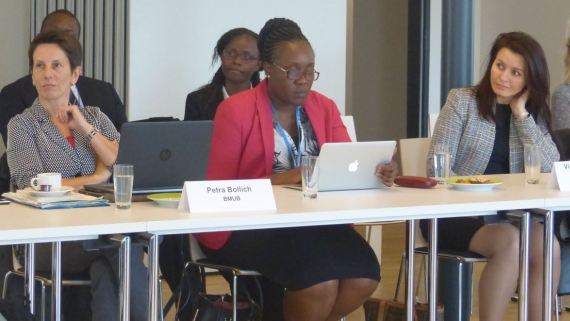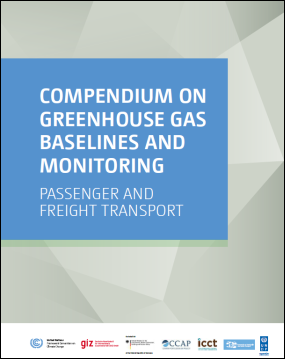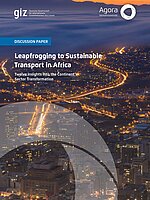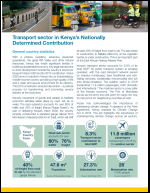Transport and climate meeting back to back

The Round Table Discussion on NDC Implementation and Transparency in Transport highlighted the need for capacity development and funding innovations.
‘We cannot use the climate solutions of yesterday to solve tomorrow’s challenges of decarbonized transport,’ stated one of the participants of the Round Table Discussion on NDC Implementation and Transparency in Transport. The discussion was held back to back with the United Nations Framework Convention on Climate Change (UNFCCC) sessions of the Subsidiary Bodies in Bonn on 12 May 2017.
More than 30 international representatives from various climate and transport initiatives and from different parties came together for a round table discussion on the lessons learned regarding NDC (Nationally Determined Contributions) implementation in the transport sector and on ways to increase the level of ambition and the requirements of transparency frameworks in the sector. Since many international cooperation projects are already assisting countries with different aspects of NDC implementation in the transport sector, the discussion captured the increasing need to engage in dialogue, manage knowledge and coordinate activities at the interface between transport and climate change mitigation.

The panellists identified the alignment of NDC formulation and long-term climate strategies as a crucial requirement for meeting the goals of the Paris Agreement. However, since the first NDCs were put together hastily to meet the Paris deadline, many of them lack appropriate underlying data. This development was confirmed by Ms Achieng Ogola, Climate Change Directorate, Kenya, who stressed the urgent need to work towards making data appropriately robust in order to adequately commit to NDCs.
Several participants emphasised the necessity of acknowledging the different starting points of countries when it came to developing their sectoral climate change mitigation strategies. For developing countries, it is essential that they receive proper support and capacity development for implementing the NDCs, something which is also an important precondition for enhancing the level of ambition.
When it came to funding mitigation in the transport sector, some participants highlighted the need for a clear policy framework in order to leverage private sector finance. Private investors were only attracted if they could see a business case and a high level of investment security. Nevertheless, private finance cannot be expected to facilitate the bulk of mitigation options in the transport sector, and climate change mitigation finance alone will not solve sustainable transport challenges. Around USD 28 billion had been spent by development banks on transport – far more than climate change mitigation finance would be able to deliver, as another participant argued. Capacity development was said to be key in addressing the lack of bankable and sustainable projects, but it is not the final solution to the funding challenge – funding innovations are needed. Low-rated countries in particular are struggling to access finance.
 The newly published Passenger and Freight Transport Volume represents an effort to build capacity in this area. It provides a comprehensive guide to existing methodologies for GHG quantification of different types of transport mitigation actions, offering readers an overview of available methodologies for the mitigation action they are considering. Lead author Chuck Kooshian, Transportation Policy Analyst with the Center for Clean Air Policy (CCAP), presented the publication, which was coordinated by the Deutsche Gesellschaft für Internationale Zusammenarbeit (GIZ) GmbH and the UNFCCC Secretariat.
The newly published Passenger and Freight Transport Volume represents an effort to build capacity in this area. It provides a comprehensive guide to existing methodologies for GHG quantification of different types of transport mitigation actions, offering readers an overview of available methodologies for the mitigation action they are considering. Lead author Chuck Kooshian, Transportation Policy Analyst with the Center for Clean Air Policy (CCAP), presented the publication, which was coordinated by the Deutsche Gesellschaft für Internationale Zusammenarbeit (GIZ) GmbH and the UNFCCC Secretariat.
While the many presented initiatives showed that climate change mitigation actions in the transport sector are increasingly gaining momentum, marginal approaches to sustainable transport are not enough to keep global warming to well below 1.5 degrees.
The round table discussion was organised by the Advancing Transport Climate Strategies project, which is being implemented by GIZ and funded by the International Climate Initiative (IKI) of the German Environment Ministry (BMUB).
The link has been copied to the clipboard
Contact
IKI Office
Zukunft – Umwelt – Gesellschaft (ZUG) gGmbH
Stresemannstraße 69-71
10963 Berlin









![[Translate to English:] Six recommendations for a climate-friendly transport sector](/legacy/_processed_/a/0/csm_200617_NDCs_Enhancement_GIZ_1252126f3e.jpg)


